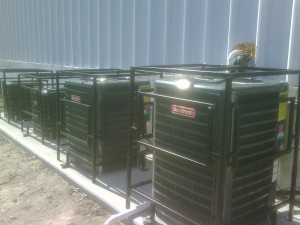It’s such a common problem when the weather heats up like it has this past week. We hear it all the time, “my system is low on gas,” or “my freon is low again.” If your system “uses” refrigerant, you have a larger problem!
Here’s what you need to know: air conditioning systems aren’t like a car; they don’t burn gas to operate. Your air conditioner is a closed loop, it cools the air by changing the refrigerant inside the copper coils from its liquid state to its gaseous state. In its liquid state, R410a and R22 are very cold. In the gaseous state, both chemical compounds are hot.
It’s your compressor’s job to compress the gas back into the liquid and pump the gas from the outdoor unit, where the heat is released into the air to help cool the gas back into liquid form, back through the copper lineset and into the air handling unit that is usually located inside your house. The air handler brings the warm air in through the returns and draws it across the cold coil to cool it, conditioning your home.
So, should your system need gas?
No, it shouldn’t, not unless there’s been a leak or a technician adjusted your charge. Refrigerant is costly. An improper charge makes your system work harder than it has to, increasing run time AND your power bills.
Getting really low on refrigerant can cause your system to freeze up. That can cause many different problems. First of all, it will stress the compressor as it tries to pump and can’t. Then, the system will shut down, then the ice will melt–rapidly. When that happens, the water can’t be contained by the drain lines as they can’t handle so much water. This leads to water in your home, on your ceiling, or on your floors, which is never good!
So, if you think your system isn’t cooling well, maybe it’s time for a tune up. If you’re told that you need to add refrigerant, be careful! Many companies will offer a tune up for a ultra low price just to find things wrong with your system and get a repair. Our precision tune up specials are located in the promotions section of our website and are very thorough and competitive. Preventative maintenance is the best way to prevent leaks in the system. Thorough cleanings are the only way to keep the corrosion in the environment from wearing away the metal and allowing your coils to spring leaks. Besides, the unit will be more efficient when clean!
A Word on Freon or R22
Recently, the EPA decided to uphold the limits on how much Freon can be made and sold. It contains chemicals that have been proven to be harmful to the ozone layer. So, when that leaks into the environment, it can cause damage to it. Because of the production limits, the price of R22, also known as Freon, has skyrocketed. So, be prepared to pay more for that recharge, should your system require it.
It’s our policy to only charge a system with a leak check. We will identify the leak for you and offer a repair or replacement of the leaking part. Some copper coils can be welded and fixed, but many coils are made of aluminum and can’t be welded. They simply have to be replaced. Sometimes, replacing the unit makes more sense, but we can help with providing the information that you need to make an informed decision.
When you need us, we’re here. So Don’t Sweat, Call Bayonet!


